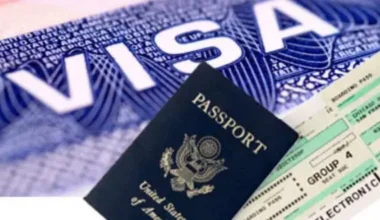For many African students, studying abroad—especially in the United Kingdom—represents more than just an opportunity for high-quality education. It embodies a dream of securing a better future, gaining global exposure, and ultimately obtaining a permanent visa to build a life in the UK. However, transitioning from a student visa to a work visa is a critical step in this journey, and understanding the process is essential for success.
The UK has long been a favored destination for international students, offering prestigious universities and a vibrant multicultural environment. Yet, the reality is that a student visa alone does not grant long-term stay beyond the course duration. To legally work and eventually settle in the UK, students must transition to a work visa.
This article provides a comprehensive guide on how to navigate this transition, covering the types of work visas available, eligibility criteria, application processes, and key strategies for success.
What is UK Student Visa?
Before exploring work visa options, it is crucial to understand the UK student visa system. The most common visa for international students is the Tier 4 (General) Student Visa, which allows students to study at a recognized UK educational institution. This visa is typically valid for the duration of the course, with an additional period (usually four months) granted after graduation to prepare for the next steps.
However, the Tier 4 visa has work restrictions, limiting students to part-time employment during studies. To work full-time and build a career in the UK after graduation, transitioning to a work visa is necessary. Fortunately, the UK offers several pathways for graduates to remain and work legally, provided they meet the necessary requirements.
Types of Work Visas Available for Graduates
1. Skilled Worker Visa
- Overview: This is the most common route for graduates seeking employment in the UK. It replaced the Tier 2 (General) Work Visa and is designed for individuals who have a job offer from a UK employer with a valid sponsor license.
- Eligibility:
- A job offer from a UK employer with a sponsor license.
- The job must meet the required skill level (RQF Level 3 or above).
- Minimum salary threshold (typically £26,200 per year or the going rate for the role).
- Proof of English language proficiency (automatically met if you studied in the UK).
- Application Process:
- Secure a job offer and obtain a Certificate of Sponsorship (CoS).
- Submit an online application with supporting documents.
- Pay the application fee and healthcare surcharge.
- Duration: Up to 5 years, with the option to extend or apply for settlement (indefinite leave to remain).
2. Graduate Visa
- Overview: Introduced in July 2021, this visa allows international students to stay in the UK for up to two years (three years for PhD graduates) after completing their degree.
- Eligibility:
- Must have completed a degree at a recognized UK institution.
- Application must be submitted while the student visa is still valid.
- Application Process:
- Apply online within the UK.
- Provide proof of degree and identity.
- Pay the application fee and healthcare surcharge.
- Duration: 2 years (3 years for PhD graduates). This visa cannot be extended but allows switching to another visa type, such as the Skilled Worker Visa.
3. Start-Up Visa
- Overview: Designed for graduates with innovative business ideas.
- Eligibility:
- A business idea that is innovative, viable, and scalable.
- Endorsement from an approved UK institution or business organization.
- Application Process:
- Secure an endorsement.
- Submit an online application with proof of financial stability.
- Pay the application fee and healthcare surcharge.
- Duration: 2 years, with the option to switch to the Innovator Visa afterward.
4. Global Talent Visa
- Overview: For individuals recognized as leaders or potential leaders in academia, research, arts, or digital technology.
- Eligibility:
- Endorsement from a recognized UK body (e.g., Royal Society, Tech Nation).
- Proof of exceptional talent or promise in the field.
- Application Process:
- Apply for endorsement.
- Submit a visa application online.
- Pay the application fee and healthcare surcharge.
- Duration: Up to 5 years, with the option to extend or apply for settlement.
5. Health and Care Worker Visa
- Overview: For qualified healthcare professionals, including doctors, nurses, and allied health professionals, with job offers from the NHS or an approved employer.
- Eligibility:
- A job offer in an eligible healthcare role.
- Proof of English language proficiency.
- A valid Certificate of Sponsorship.
- Application Process:
- Secure a job offer and Certificate of Sponsorship.
- Submit an online application.
- Pay the application fee and healthcare surcharge (reduced for this visa).
- Duration: Up to 5 years, with the option to extend or apply for settlement.
Steps to Transition from a Student Visa to a Work Visa
- Plan Ahead: Research visa options before graduation and align them with career goals.
- Secure a Job Offer: Start job hunting early through university career services, networking, and job fairs.
- Check Employer Sponsorship: Ensure the employer has a valid sponsor license (check the UK government’s list of licensed sponsors).
- Gather Required Documents:
- Passport and biometric residence permit (BRP).
- Certificate of Sponsorship (if applicable).
- Proof of qualifications.
- Proof of English proficiency (if required).
- Bank statements to demonstrate financial stability.
- Apply for the Visa: Submit an online application with accurate details to avoid delays.
- Attend Biometrics Appointment: Provide biometric information as part of the process.
- Await a Decision: Processing times vary, so check official UK government resources for updates.
Tips for a Successful Transition
- Leverage University Career Services: Utilize CV workshops, mock interviews, and networking opportunities.
- Build a Professional Network: Connect with industry professionals, alumni, and recruiters.
- Gain Work Experience: Internships and part-time jobs enhance employability.
- Stay Updated on Immigration Policies: UK immigration laws change frequently, so check official sources.
- Seek Professional Advice: Immigration advisors can provide guidance tailored to individual situations.
Conclusion
For many Nigerian and African students, studying in the UK is the first step towards building a permanent future abroad. Successfully transitioning from a student visa to a work visa requires strategic planning, persistence, and informed decision-making.





